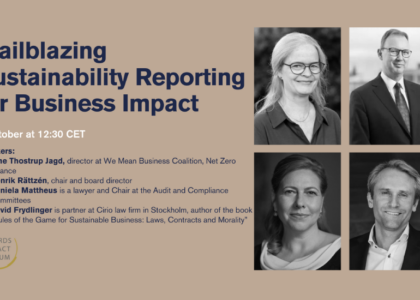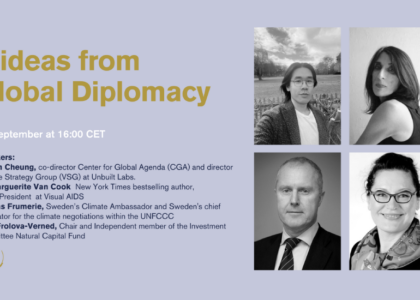by Lise Kingo, Independent Board Director at Sanofi, Danone, Covestro and Aker Horizons. Former CEO UN Compact. Member Strategic Advisory Board at Boards Impact Forum

Corporate and political leadership towards a better, more sustainable world means taking difficult and sometimes unpopular decisions.
2022 will go down in history as one of the years when the world was turned upside down.
With COVID-19 still lurking in the background, fundamental agreements and values were violated and sent the world into a downward spiral of inflation, increasing food and energy prices, while the climate clearly demonstrated what happens when global temperatures approach a 1.5 degrees Celsius increase. Today, we face a deeply fragmented world that is becoming more divided. A world where corporate and political leadership towards a better, more sustainable world means taking difficult and sometimes unpopular decisions. But now is not the time to waver.
Table of Contents
The Balanced Scorecard of the world is in the red
It is devastating to look back to 2015, when the Global Goals were unanimously approved at the United Nations and became the Balanced Scorecard for the world. I had just joined the U.N. Global Compact as the new CEO and executive director, and I still recall the shared excitement by heads of state and business leaders that now we had a new way of tracking our collective progress towards becoming a more sustainable society leaving no one behind.
Today, the pandemic has wiped out more than four years of progress of eradicating poverty, with more than 24 million learners at risk of never returning to school. One quarter of the global population is living in conflict, levels not seen since 1946. A record 100 million people are forcibly displaced worldwide, 80 percent due to dangerous conflict situations exacerbated by droughts, monsoon rains and floods. The war in Ukraine is causing food, fuel and fertilizer prices to skyrocket, spurring a global food crisis.
At the same time, the window to avert the climate crisis is rapidly closing. Leading up to COP27, the Intergovernmental Panel on Climate Change warned that to avoid a climate catastrophe we need to cut global emissions by 45 percent by 2030. COP27 finally delivered the long-awaited Global Fund, but it didn’t deflect a climate catastrophe — ending with vague political language and no firm commitments to phase out fossil fuels.
So, the world’s Balanced Scorecard is in the red. While political leaders lack the power to turn the tide, business leaders need to take the situation in hand and rethink their measures of success. Not by the ability to create shareholder value for the short term, but by the ability to deliver planetary, human and stakeholder value as the only means towards delivering economic value.
There is no way back to shareholder capitalism
In times of trouble, it is tempting to seek back to the old ways. That’s what we have seen in the U.S., for example, with the anti-ESG movement, or anti “woke-capitalism” movement, seeking to turn back time to Milton Friedman’s ideas of shareholder capitalism. But as we are reminded by Nicolai Tangen, who leads Norway’s $1.2 trillion oil fund: “We are observing the backlash against ESG in some places in America. Despite times being volatile in financial markets and increasingly in the economy, we think it’s more important than ever to retain the focus on these extremely important matters.”
While political leaders lack the power to turn the tide, business leaders need to take the situation in hand and rethink their measures of success.
Tangen is urging investors to stay focused on environmental, social and governance issues, warning of a real danger that economic turmoil and a political backlash in the U.S. will dampen support for the agenda. There is a strong momentum behind ESG from both governmental institutions, businesses and the financial sector — in the form of the Inflation Reduction Act in the U.S., the European Union Taxonomy and the Glasgow Financial Alliance for Net Zero led by Mark Carney. But stakeholder capitalism is still a young trend that has not yet reached its tipping point, and it will need a lot of push from a broad palette of global stakeholders to become mainstream.
Boards play a crucial role in transitioning towards stakeholder capitalism
In recent years, ESG has become a top strategic priority for many businesses across the world. Boards must ensure full integration of ESG across strategy, operations and stakeholder engagement. Failing to do so is being seen as a breach of fiduciary duty.
The European Commission’s draft directive on Corporate Sustainability Due Diligence, for example, introduces a “directors’ duty of care” provision requiring directors to consider the human rights and environmental consequences of their decisions in the short, medium and long term. It demands that directors put into place and oversee due diligence actions and policies, and adapt the company’s strategy where necessary.
According to a recent study by Boston Consulting Group and the INSEAD Corporate Governance Center, 91 percent of board directors think their boards should devote more time to the strategic aspects of ESG issues. The survey findings also reflect that boards can add the most value in their mission of stewarding the company over the long term by ensuring that ESG is integrated into the corporate strategy. Yet 53 percent of these directors say their boards are not doing this effectively.
In my mind, board directors have a great platform for driving specific companies — and the world — towards stakeholder capitalism through a strategic, transformational approach to ESG. It is the duty of each director to speak up if the conditions for doing so are not optimal. In today’s world upside down, everyone must use their platforms to get back on course towards a just, regenerative, nature-positive, net-zero economy.
This blogpost was originally shared at Green Biz
Coming events and join Boards Impact Forum
Upcoming webinars at Boards Impact Forum Our Events – Boards Impact Forum
Join as a member or to receive the newsletter Join the Forum – Boards Impact Forum








Recent Comments